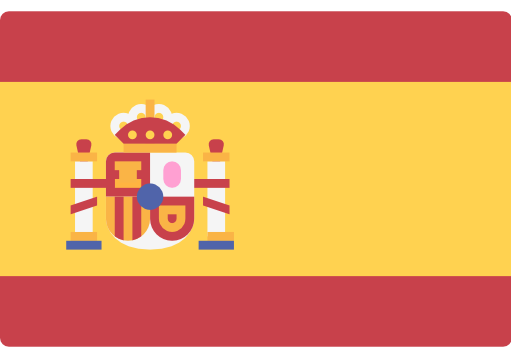Best Online Casinos in Spain

Spain has an overarching minimum age for all gambling activities, irrespective of the region you are in. Players must be 18 years of age or older in order to gamble legally. This includes gambling at land-based casinos, the lottery and sports betting parlours, as well as all forms of online gambling.
Spain is one of the most avid gambling countries in the world, with the market divided into sports betting, casinos, poker, lottery, bingo and other gaming types.
Sociedad Estatal Loterias y Apuestas del Estado was the leading gambling and betting company in Spain in 2021, with sales approaching €9.4 billion. The state-owned company manages all national lotteries and games in the European nation.
The Spanish gambling market does not quite rival its UK counterpart financially, but Spain has a vibrant gambling culture with many world-class casinos, such as the Casino Gran Madrid and the Casino de Barcelona. It also has a steadily growing online gambling market with many operators licensed by the Spanish gambling authority. Spain’s regulatory authority is relatively liberal.
In Spain, online gaming is regulated by the Directorate General for the Regulation of Gambling (DGOJ), a government-run entity that licenses operators and enforces the country’s gambling laws. A necessary prerequisite in applying for a gambling operator’s licence is proving that the games on offer are 100% fair.
Online casinos in Spain have the largest market share of the online gambling market, followed by sports betting and lotteries. Online casinos are undeniably taking over online gambling in Spain, and this trend shows no signs of slowing down.
Spanish Gambling Laws and Regulations
In 2006 the Spanish government passed its first internet gambling laws, which legalised sports betting both online and in licensed betting outlets.
Gambling matters are regulated in Spain on a national and sub-national level depending on the territorial scope of the specific gambling activity on offer. The country is divided into 17 autonomous regions, each with its own legal capacity to regulate certain local activities taking place within their regional territories.
As gambling is a competence transferred to the autonomous regions, each of those regional governments regulates gambling matters occurring within its provincial territory. Therefore, land-based gambling activities are subject to regional and local regulations, which vary from one autonomous region to another and online gambling activities are regulated at a national level because they are offered in more than one regional territory.

The applicable legal regime varies considerably from one region to another. However, there are no particular regions or localities in Spain that favour the offering of gambling activities more than others.
Offshore operators may not offer gambling products in Spain under foreign licences. These operators may, however, apply for and, in many cases, obtain the relevant Spanish licence or authorisation to offer gambling products in Spain. It is not mandatory to incorporate a Spanish company to apply for gambling licences. Rather it is deemed sufficient in most cases, especially in the online gambling market, to be a company based in the EU and equivalent to a Spanish limited liability company.
Since the online gambling activities offered on a national level were regulated for the first time beginning at the end of 2011, and the first licences were granted in June 2012, Spanish authorities initiated an enforcement programme aimed at the black market, comprising those offshore operators offering online gambling services to Spanish residents without having the applicable mandatory licences.
This is an ongoing enforcement programme by the Spanish authorities, who carry out random audits to verify whether offshore operators without a licence in Spain have IP blocking systems to impede Spanish residents from accessing their platforms, as well as making deposits and playing.
This enforcement programme has resulted in several fines being imposed on offshore operators. Some of those operators accepted and paid the fines to prevent them from being disqualified from applying for a Spanish online gambling licence. Having been sanctioned for offering online gambling services either directly or through another company within the same group of companies can lead to an operator being prevented from obtaining a Spanish online gambling licence.
The body created in Spain through the Gambling Act to regulate online gambling activities on a national level is the General Directorate for the Regulation of Gaming Activities (DGOJ) and is the only entity entitled to:
- Adopt secondary regulations developing the main gaming regulations.
- Control and inspect the operation of gaming activities.
- Prosecute illegal gaming activities.
- Decide on the claims filed against the operator.
- Collaborate with other Spanish authorities, such as the financial or criminal authorities in the enforcement of anti-money laundering legislation.
The DGOJ is a body falling under the Ministry of Consumer Affairs that is entitled to regulate, authorise, monitor, control and sanction gaming activities on a national level, including advertising and commercial communications.
Not all types of online games can be offered. Licensed operators can only offer those games specifically approved and regulated. Online gambling activities offered by Spanish licensed operators must be aimed at Spanish residents only, through IP geo-localisation being implemented to avoid non-Spanish residents accessing the games.
Offshore operators without Spanish licences must use an IP geo-localisation system to impede Spanish residents from accessing their platforms. This means that Spanish residents should only have access to online gambling platforms that are licenced by the relevant authority in the country.
To apply for and obtain online gambling licences, it is necessary to be an EU-based company equivalent to a Spanish limited liability company, as well as have their technical platform duly certified by a recognised testing lab. In addition, operators with Spanish online gambling licences must have their main server located in Spain, enabling DGOJ access for monitoring and control purposes.
There are two requirements that need to be met in terms of payment methods regarding online gambling:
- The integration of the operator platform and the payment services provider has to be certified in order to guarantee security and traceability.
- It is forbidden for gambling operators to provide credit or financial support to players.
There are no specific restrictions regarding payment mechanisms for gambling, although cryptocurrencies and bitcoin are not permitted.
The History of Gambling in Spain

Spain has a rich history of gambling and casinos dating back to the 19th century. From underground gambling dens to today’s luxury casinos, Spain has always had a love affair with the thrill of gambling.
Early on, gambling was unregulated and most often conducted in gambling dens. These were illegal establishments offering poker, roulette and blackjack. Many of these establishments were forced to shut down as the government cracked down on illegal gambling.
In the early 20th century, the Spanish government began to legalise and regulate certain forms of gambling, including lottery and horse racing, paving the way for the rise of legal casinos in Spain.
Casino Gran Madrid was the first legal casino in Spain and opened in 1981. In recent years online gambling has become increasingly popular in Spain. The Spanish government has also begun to regulate online gambling to protect players and ensure a safe and fair gambling environment.
These days, Spain is possibly the most flourishing betting region in Europe, facilitating numerous casinos and being Europe’s prime go-to holiday destination is an additional factor.
Casinos have stood the test of time in Spain as many of them are still around, even though online casinos have grown in popularity since the government first looked at regulating burgeoning online gambling sites in 2011 after the rapid rise of internet gambling since 2004.
Types of Gambling in Spain
Most forms of gambling can be found in Spain, where gambling locations are often part of multi-purpose venues. The Spanish online gambling market is ever-expanding, with sports betting as the main source of income for licensed operators.
Online Casino Gaming
Online casino gaming has become highly popular in Spain. The latest reports from the country’s gaming regulator show that the online gaming sector has again shown remarkable growth with a 50% year-on-year growth rate.
In the online casino segment, there was growth of 0,64% compared to the 4th quarter of 2022 and a year-on-year growth variation of 29.2%. This annual growth occurred mainly in slot machines, with 31.3% and in live roulette with 32.2%.
Land-Based Casinos
Land-based gambling locations in Spain usually form part of a resort, restaurant, or other multi-purpose locations.
There are 53 resort casinos in Spain, which are highly popular amongst residents and visiting tourists alike. The country has a well-regulated land-based gambling sector, making it an outstanding destination for tourists looking to enjoy some gambling fun.
Sports Betting
According to a recent survey conducted in October 2022, 38.7% of the Spanish population was involved in sports betting activities in the previous 12 months.
In Spain sports booking takes place primarily over the internet, with 76.6% of sports fans who participated in sports betting doing so primarily via the internet using mobile apps.
BET365 is the most commonly used sports betting platform among those participating in this type of gambling. Although football is the most popular sport in Spain, betting enthusiasts watch and bet on a wide variety of sports in the country.
Horse Racing
Horse racing is one of Spain’s most popular betting markets and with locals spending around 15% of their income wagering on various sports, horse racing enjoys a significant share of the market.
Lottery
As measured by the total prize payout, the Spanish Christmas Lottery is the biggest lottery draw worldwide. There are lottery games being run in Spain every day, but the National Lottery is an official and legal lottery issued by the government of Spain and has been in existence since 1763.
Online Poker
The Spanish Gaming Act, or Law 13/2011, regulates all gaming in Spain, and this statute is very tough on online poker operators, who are expected to jump through numerous hoops in order to obtain a licence and are required to pay a 15% tax on gross game returns.
Online poker operators are required to block players from outside Spain from accessing their networks, but the regulator finds this rule difficult to enforce, and online poker in Spain remains popular, especially with offshore sites.
Fantasy Sports
Spain is one of the leading sporting capitals of the world, with numerous successful football, basketball, handball and water polo teams and players.
It is unsurprising that fantasy sports are gaining traction in this European country, and there are hundreds of daily fantasy sites available to Spanish gamblers to choose from where they can find fantastic bonus packages and a catalogue of sports to wager on.
Casino Bonuses in Spain
There are various types of bonuses on offer to all users of online casinos in Spain. There are hundreds of online casino sites in Spain competing for your business, and like elsewhere in the world, to attract players, they offer fantastic bonuses.
Here are some of the most popular bonus types typically on offer at top Spanish online casinos:
- Welcome Bonus – The casino provides you with free cash beyond your deposit amount as a greeting, usually as a percentage of your deposit and can be distributed over your first several transactions.
- No Deposit Bonus – Players will receive this bonus without a deposit. This can be in either monetary value or free spins, but you can win real money.
- Reload Bonus – For existing players, rewarding you for deposits by matching your deposits or in the form of free spins.
- Free Spins – These are free spins on real money slots. This online promotion is linked to your account and does not require codes.
- Loyalty bonus – Casinos offer a loyalty programme to reward regular players for every game or deposit. Points can be redeemed for cash or free spins, and additional benefits can include sweepstakes, luxury travel or personalised gifts.
- Invite a Friend – You will receive a reward if you invite a friend to your favourite online casino. Most casinos pay a set bonus when your friend signs up and makes their first deposit.
Almost all casino sites offer monetary incentives. It is important to evaluate the quality of the website in the same way as the online casino bonus. When playing at the best online casinos, the bonus features will reflect this by being the best offers available.
Top Spanish Payment Methods for Gambling

Debit and credit cards such as Visa and Mastercard are the most commonly used payment methods in Spain. These are the most popular, as most people possess a debit or credit card from a financial institution.
E-wallets like Skrill, NETELLER, PayPal and Trustly are also popular payment methods accepted by Spanish betting sites, as well as bank transfers and Paysafecard.
Nearly half of all eCommerce payments in Spain are made via credit card, but that is expected to decline to around 30% over the next five years as digital wallets and other payment methods gain ground.
Safer Gambling Tools
Spain’s Council of Ministers has approved the “Royal Decree on Responsible Gaming Environments” to enforce new measures and gambling restrictions. This aims to strengthen the protection of underage and vulnerable consumers, especially those aged 18 to 25.
All licensed operators will be required to adopt new duty-of-care rules to monitor and record risk profiles of customers under the age of 25.
Spanish operators are required to monitor any customer accumulating a net loss of €600, or €200 if under the age of 25 over a period of 3 consecutive weeks and should be treated as an “at-risk” gambler.
Operators will be required to:
- Send a warning to at-risk players if potentially harmful behaviour is detected, as well as a monthly summary of their gaming activity.
- Notify users in this category that they cannot use credit cards to finance their gambling spend.
- Operators will be barred from sending vulnerable patrons promotional material and including such persons in VIP programmes.
- Marketing teams are only allowed to send promotional material to those aged 18 to 25 if they previously interacted with the gaming company.
The new rules include additional protection for those who have requested safer gambling restrictions on their gambling accounts or who have signed up to the national self-exclusion register.
The decree sets out to promote safer and more responsible gambling practices by all those deemed vulnerable to gambling addiction and is a holistic approach, along with measures such as the advertising restrictions coming into effect, intended to prevent problem gambling in the future.
The new regulations represent a significant change to the Spanish gambling industry, putting the responsibility for reducing the risk of problem gambling on the operators and aiming to protect the vulnerable in Spanish society.
Those facing gambling-related problems in Spain can approach several organisations tasked with aiding them, here are 2 of these with their contact details:
The Association for the Prevention and Help to Gamblers
APAL is a non-profit organisation that supports and assists individuals struggling with gambling addiction, offering counselling support, education and prevention programmes to help those affected and their families. They also actively promote responsible practices in Spain.
Telephone: +34 914 07 68 99
Website: www.apalmadrid.org
Jugar Bien
Jugar Bien is a non-profit organisation in Spain that promotes responsible gambling and provides a range of services to problem gamblers and those affected indirectly, including information, advice and support.
Telephone: +34 915 71 40 80
Website: www.jugarbien.es
Spanish Gambling FAQ’s
Who regulates gambling in Spain?
The body created in Spain to regulate online gambling activities on a national level is the General Directorate for the Regulation of Gaming Activities.
Is online gambling safe in Spain?
Most forms of gambling are legal and regulated in the country, meaning players have access to safe land-based and online casinos in Spain, as well as sports betting, lottery, poker and daily fantasy sports options.
What is the most popular type of online gambling in Spain?
Casinos have the largest market share of the Spanish online gambling market, followed by sports betting and lotteries. Online casinos are undeniably taking over online gambling in Spain, with phenomenal year-on-year growth in that sector.
What is the largest casino in Spain?
The largest casino in Spain is the Gran Madrid Casino Torrelodones, which offers a huge variety of entertainment and gaming tables.
How many casinos are in Spain?
Spain is home to more than 50 fine casinos, so anyone planning a beach holiday or a getaway to soak up the country’s cultural heritage in cities like Barcelona or Madrid will also have ample opportunity to enjoy quality gaming.



